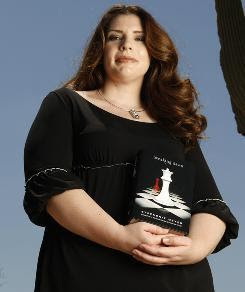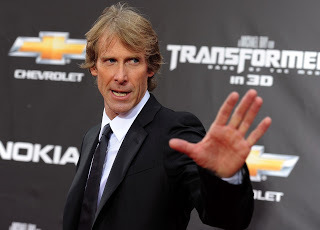From Un-me To Real Me: How Stephenie Meyer Killed My Muse
Part Five
 For fourteen years I had been obsessed with writing. I had written about nine books, two of which had been published and a third had just spent three years in limbo with a publisher that didn't fulfill its end of the bargain. My co-author and I were at odds and my "writing career" was not what I had hoped it would be.
For fourteen years I had been obsessed with writing. I had written about nine books, two of which had been published and a third had just spent three years in limbo with a publisher that didn't fulfill its end of the bargain. My co-author and I were at odds and my "writing career" was not what I had hoped it would be.
I was discouraged, depressed, dissatisfied, and done.
Along came Stephenie Meyer in 2007 with a teen vampire novel called Twilight. I don't know what Satanic ritual she performed to gain such widespread approval, but for some inexplicable reason her horribly written books took the world by storm. When the movies began to hit in 2008, Meyer made millions off her three novels and four films over the next five years.
Here's the thing that pisses me off about Stephenie Meyer. Her books suck, and yet teenagers eat them up like candy.
I agree with author Stephen King, who, in an interview with USA Weekend , said, "The real difference is that Jo Rowling is a terrific writer and Stephenie Meyer can't write worth a darn. She's not very good."
The Great Satan of Literature?Before you ask, yes, I read the first book in her series, Twilight. I had to see for myself what all the fuss was about. And the honest truth is the books were even worse than I expected. I could spend hours picking apart Meyer's inability to structure a story, design characters of any depth, craft an intriguing romance, or write an action scene, not to mention her abuse of the English langue, which was horrifying.
Did I think my writing was superior? Absolutely! And I can point to a hundred other indie authors whose work is superior to mine who are worth all the attention Meyer got and much more.
Here was Stephenie Meyer, a middle-aged soccer mom with no previous interest in writing, churning out the most basic, badly written, adjective-stuffed melodramatic teenage drivel and making millions, and yet thousands of other writers, myself included, with much better ideas and years of practice couldn't get a single publisher to take a chance on us.
I remember back in 1998 when Director Michael Bay release Armageddon, People Magazine published a story on why some big-shots in Hollywood viewed Michael Bay as "the great satan of movies." Their point was simple. Michael Bay's over-stylized and empty-headed approach to filmmaking was devaluing the craft.
 Michael Bay says, "Talk to the hand!"
Michael Bay says, "Talk to the hand!"
as he walks to the bank.
I'm calling out Stephenie Meyer—though I am hardly the first to do so—to say that she's doing the same thing to the craft of writing, her and the slew of copycats and wannabes she inspired—yes, I'm thinking about you E.L. James.
The Real ProblemBut Meyer's success put a big spotlight on the real problem—big publishers.
I began to realize that publishers aren't seeking quality work anymore. They're looking to fill a predetermined novel mold established by a marketing team to guarantee major sales. They don't care about content or genre or how good or bad an author is at their craft. They know the market and they want content to fill what the market wants.
Author Alan Moore said in November, 2015, “Publishing today is a complete mess. I know brilliant authors who can’t get their books published." He went on to explain that the reason is because publishing houses are afraid of taking risks on fiction. Moore’s solution? “Publish yourself. Don’t rely upon other people.” (Alan Moore Advises New Writers to Self-Publish Because Big Publishers Suck.)
Big publishers just want to meet the market demands and make as much money as they can in the process.
This is a major shift from just a few decades ago when publishing companies were all about discovering "the next great American novel." It's not really their fault either. With the rise of self-publishing and digital books, combined with the increasing cost of paper and printing, publishers started realizing that their old way of doing things was no longer working. Editors no longer had the time to sift through stacks of manuscripts to determine which novel was most worthy of publication. The digital age was booming fast and publishers had to act as quickly as possible to keep money flowing in.
And they've been making bad decisions ever since.
So I figured, fine, if the world was done with quality storytelling, so was I.
And my muse died.
To be continued...

 For fourteen years I had been obsessed with writing. I had written about nine books, two of which had been published and a third had just spent three years in limbo with a publisher that didn't fulfill its end of the bargain. My co-author and I were at odds and my "writing career" was not what I had hoped it would be.
For fourteen years I had been obsessed with writing. I had written about nine books, two of which had been published and a third had just spent three years in limbo with a publisher that didn't fulfill its end of the bargain. My co-author and I were at odds and my "writing career" was not what I had hoped it would be.I was discouraged, depressed, dissatisfied, and done.
Along came Stephenie Meyer in 2007 with a teen vampire novel called Twilight. I don't know what Satanic ritual she performed to gain such widespread approval, but for some inexplicable reason her horribly written books took the world by storm. When the movies began to hit in 2008, Meyer made millions off her three novels and four films over the next five years.
Here's the thing that pisses me off about Stephenie Meyer. Her books suck, and yet teenagers eat them up like candy.
I agree with author Stephen King, who, in an interview with USA Weekend , said, "The real difference is that Jo Rowling is a terrific writer and Stephenie Meyer can't write worth a darn. She's not very good."
The Great Satan of Literature?Before you ask, yes, I read the first book in her series, Twilight. I had to see for myself what all the fuss was about. And the honest truth is the books were even worse than I expected. I could spend hours picking apart Meyer's inability to structure a story, design characters of any depth, craft an intriguing romance, or write an action scene, not to mention her abuse of the English langue, which was horrifying.
Did I think my writing was superior? Absolutely! And I can point to a hundred other indie authors whose work is superior to mine who are worth all the attention Meyer got and much more.
Here was Stephenie Meyer, a middle-aged soccer mom with no previous interest in writing, churning out the most basic, badly written, adjective-stuffed melodramatic teenage drivel and making millions, and yet thousands of other writers, myself included, with much better ideas and years of practice couldn't get a single publisher to take a chance on us.
I remember back in 1998 when Director Michael Bay release Armageddon, People Magazine published a story on why some big-shots in Hollywood viewed Michael Bay as "the great satan of movies." Their point was simple. Michael Bay's over-stylized and empty-headed approach to filmmaking was devaluing the craft.
 Michael Bay says, "Talk to the hand!"
Michael Bay says, "Talk to the hand!"as he walks to the bank.
I'm calling out Stephenie Meyer—though I am hardly the first to do so—to say that she's doing the same thing to the craft of writing, her and the slew of copycats and wannabes she inspired—yes, I'm thinking about you E.L. James.
The Real ProblemBut Meyer's success put a big spotlight on the real problem—big publishers.
I began to realize that publishers aren't seeking quality work anymore. They're looking to fill a predetermined novel mold established by a marketing team to guarantee major sales. They don't care about content or genre or how good or bad an author is at their craft. They know the market and they want content to fill what the market wants.
Author Alan Moore said in November, 2015, “Publishing today is a complete mess. I know brilliant authors who can’t get their books published." He went on to explain that the reason is because publishing houses are afraid of taking risks on fiction. Moore’s solution? “Publish yourself. Don’t rely upon other people.” (Alan Moore Advises New Writers to Self-Publish Because Big Publishers Suck.)
Big publishers just want to meet the market demands and make as much money as they can in the process.
This is a major shift from just a few decades ago when publishing companies were all about discovering "the next great American novel." It's not really their fault either. With the rise of self-publishing and digital books, combined with the increasing cost of paper and printing, publishers started realizing that their old way of doing things was no longer working. Editors no longer had the time to sift through stacks of manuscripts to determine which novel was most worthy of publication. The digital age was booming fast and publishers had to act as quickly as possible to keep money flowing in.
And they've been making bad decisions ever since.
So I figured, fine, if the world was done with quality storytelling, so was I.
And my muse died.
To be continued...

Published on May 23, 2016 04:00
No comments have been added yet.



